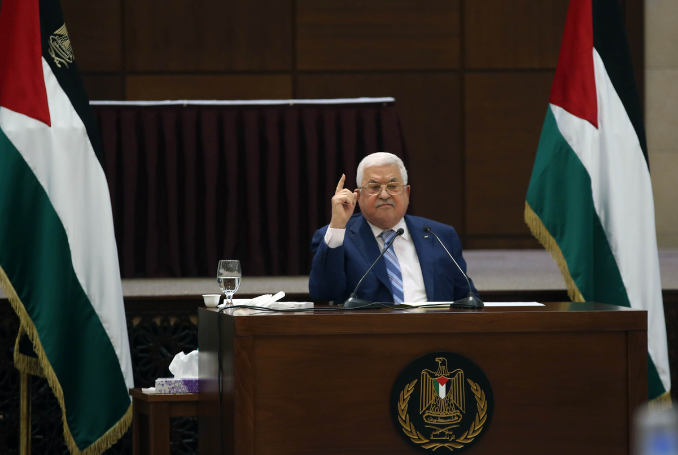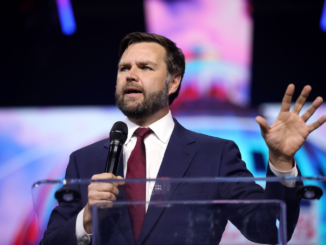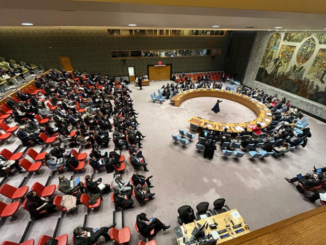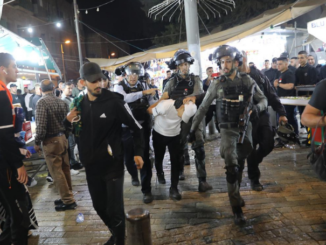
Writing in the Al-Jazeera Arabic website, Areeb al-Rantawi offers a critical analysis of the PLO Central Council meeting, highlighting Abbas’ controversial statements, the deep divisions within Palestinian politics, and the urgent need for a unified national strategy amidst the ongoing Gaza crisis.
The recent session of the PLO Central Council garnered attention primarily due to the speculation surrounding the appointment of a “second man” within the organization and President Abbas’ contentious remarks about Hamas. Otherwise, the proceedings would likely have gone unnoticed.
Public perception of the PLO and the Palestinian leadership is overwhelmingly negative, marked by doubt, accusations, and a profound lack of trust. This assessment isn’t based on our opinion but on the consistent findings of numerous public opinion polls conducted both before and after the “Al-Aqsa Flood” operation.
Calls for the revitalization, democratization, and overall activation of the PLO have been voiced by Palestinians across the board, reflecting a shared understanding of the critical juncture and the immense challenges ahead.
However, these appeals and initiatives, supported by various Arab nations (such as Doha, Algeria, and Cairo) and influential global powers (such as Moscow and Beijing), have been disregarded. They’ve been met with resistance and obstruction from a leadership entrenched in its exclusive control, unwilling to undertake necessary self-assessment or abandon its failing strategies, even as the threats from settlements, settlers, and the extremist right-wing dominating decision-making in Tel Aviv drew dangerously close.
Therefore, the convocation of the Council wasn’t driven by the need to “arrange the Palestinian house” and mend its internal divisions, as Ramallah’s “propaganda machine” suggests, but by a fundamentally different agenda.
It was evident that this Central Council meeting, which has effectively taken over the authority of the Palestinian people’s highest body—the National Council—acting both within and beyond its legitimate scope, lacked genuine political legitimacy, despite possessing a superficial legal quorum.
Key resistance factions, notably Hamas and Islamic Jihad (neither of which is represented anyway), were absent. The Popular Front for the Liberation of Palestine and the National Initiative officially boycotted the session. Ironically, the Council’s stated primary goal was internal unity, yet the president himself had just used the most offensive and vulgar language to describe a major Palestinian faction—the same President who claimed to have instructed his Executive Committee to explore avenues for restoring unity.
Ultimately, it’s clear that this Council meeting, held nineteen months into the devastating war of encirclement, cleansing, and genocide, wasn’t convened to address internal Palestinian national concerns, confront the enormous challenges, or honor the heroism and sacrifices of the people and resistance in Gaza. Instead, it was driven by the need to comply with external dictates aimed at reshaping and rehabilitating the Authority and the PLO to align with the requirements of the “day after” and its implications.
This context explains the widespread suspicion and doubt among the Palestinian people and factions regarding this event, which appeared inadequate for the gravity of the Palestinian moment and its inherent risks and challenges.
Politically, the unprecedented and vulgar language directed at segments of the Palestinian people and their organizations was regrettable. While the offensive language itself is significant, it doesn’t diminish the importance of the underlying messages.
The assertion that the “hostage” issue is merely Israel’s pretext for continuing its war of cleansing and genocide is strongly refuted by those who make it. This is evidenced by Bezalel Smotrich’s statement just a day before the Central Council convened, where he openly declared that the liberation of the hostages was not the priority in the Gaza war, but rather the destruction of Hamas, the displacement of Gazans, the establishment of Israeli sovereignty over the Strip, and the construction of settlements to permanently close this file.
If the issue of hostages, prisoners, and detainees, and the need for their “liberation,” is indeed Israel’s pretext for its ethnic cleansing war, then what is its pretext for brutalizing and violating the West Bank so extensively?
What is its pretext for subjecting the Palestinian Authority leadership, including President Abbas, his Prime Minister, and ministers, to the most humiliating restrictions on their movement within the West Bank, Jerusalem, and when traveling abroad?
What is Israel’s pretext for its rapid and continuous annexation of Palestinian land, rights, and holy sites? What is its pretext for seizing clearance funds and imposing starvation even on PA employees?
And why would Palestinian officials, specifically President Abbas, volunteer to promote and justify the Israeli narrative? This occurs while Israeli leaders, at both security and political levels, are revealing the “fabricated pretexts” concocted by Netanyahu and his government to prolong the war, obstruct ceasefire agreements, and justify reneging on any signed agreements.
Didn’t Ramallah hear Yoav Gallant’s recent admissions about the alleged “Philadelphi tunnels,” and Ronen Bar’s testimony about the government’s actions to extend the war and undermine any chance of ending it? Behind these two figures—and what they represent—is a significant number of senior officials, former prime ministers, and opposition leaders who consistently blame Netanyahu and his extremist right-wing government for the ongoing war.
Therefore, Palestinians have every right to view this pre-determined meeting with suspicion and doubt. Its convocation was solely in the context of “day after” planning, to bury the resistance and align with the outcomes of the American-backed Israeli solution—as Trump himself stated just two days prior, indicating a shared agenda with Netanyahu.
The talk of reforming the PLO, injecting new blood, changing its leadership, and electing a “Deputy President” is a worn-out narrative that resonates with neither Palestinians nor those familiar with the intricacies of their internal dynamics.
Virtually, every Palestinian has called on the Authority and the Presidency to appoint a “Deputy President,” especially given the President’s advanced age. Historically, such demands have only brought misfortune to those who made them.
Today, the Presidency recognizes the need to formalize the “second man” position—a need (or rather, a dictate) stemming from external demands. The condition is that this position be filled by someone more aligned with the unchecked Israeli-American dominance, primarily to ensure a Palestinian “stamp” on any deal or settlement, whether tactical in the post-Gaza war context or strategic concerning the future of the Palestinian cause and national project.
This isn’t what Palestinians have long advocated for; instead, these are impositions from international capitals involved in the project of reshaping and “engineering” the Middle East, with Palestine at its core.
Instead of the long-delayed Council meeting fostering optimism for the recovery and unification of the Palestinian political system through reform and revival, its convening has deepened the division and exacerbated the dangerous rift. This is particularly evident in the hostile stances taken against a significant and influential segment of the national action factions.
It has become obvious that we are witnessing a step backward. The reconciliation file is definitively closed, and hopes for a return to national consciousness and a reawakening of conscience have been dashed.
The Central Council no longer embodies Palestinian political, social, geographical, and cultural pluralism. Instead, it has become a compliant tool for an influential faction, convened “on demand,” primarily to pass and legitimize ambiguous and questionable decisions and policies.
The Council has lost its comprehensive representative character and has transformed into a shield for the decision-making “troika” in Ramallah, isolated from the rest of the national action factions and a large part of Fatah itself, not to mention the vibrant forces within the Palestinian people outside its established factions and organizations.
For all these reasons, Palestinians now approach their meetings with apprehension and suspicion regarding the motives behind the calls for their convening, rather than eagerly anticipating regular or emergency sessions.
These developments leave open only one viable option for progress: the formation of the broadest possible Palestinian national coalition within a united national front. This front should include resistance factions, thousands of national figures, youth movements, and community initiatives, all in defense of the PLO and with the goal of reclaiming and liberating it from those who have seized control.
The remaining option is to stop knocking on firmly closed doors and instead work to open channels of communication and interaction between the living and active forces within the Palestinian people. This is crucial to prevent further erosion of the Palestinian national position and to salvage what can be salvaged from the system of the “sole legitimate representative,” thereby restoring credibility to the Palestinian national project, which has never faced such a direct and indirect threat of liquidation, even from some Palestinians themselves.
– Areeb al-Rantawi is a Jordanian writer and political analyst. He is the Director of the Al-Quds Center for Political Studies.
(Al-Jazeera Arabic website – translated and prepared by The Palestine Chronicle)








Be the first to comment